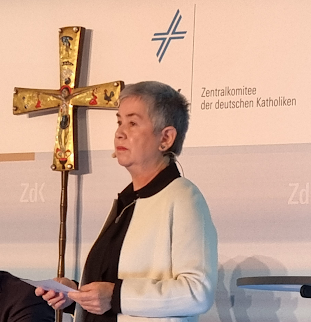German Catholic laity on the march....along the Synodal Path
Don't stop at seeing": ZdK President calls for concrete steps from World Synod
In a press release, The President and Vice-President of the Central Committee of German Catholics (ZdK) draw a mixed balance with regard to the European Synod in Prague. Important reform issues were clearly addressed and discussed. "But which positions will the bishops adopt?" asks Vice-President Prof. Thomas Söding. "It is not justifiable to stop now at seeing the problems," says ZdK President Dr Irme Stetter-Karp.
"In Prague, it has become obvious that the synodal process of the universal Church needs a constant togetherness," she continues. "The wise three-step process that has been proclaimed is: see, judge, act. But this also means that bishops and lay people must continue to be in dialogue with each other. If we uncouple judgement and action from seeing, if the grassroots of the Church is not involved in the further process, this not only gives the impression of permanent clericalism. There is also the danger that crucial experiential knowledge will fall by the wayside. That is why I very much hope that in the autumn in Rome the voices of those who are not clerics will also be in demand, including those of women and queer people."
"At the moment, it is to be expected that at the World Synod in Rome it will again only be bishops who represent the Church," says Thomas Söding. "That would be a big step back from what we experienced in Prague. Because at the European meeting of the World Synod, everyone was able to experience a diverse picture of the Catholic Church."
President and Vice-President of the ZdK unanimously declare that they returned home with new "learning knowledge". Between the different cultures and societies - also between Eastern and Western Europe - differences in the understanding of the Catholic had become clear. "We need such exchanges more often," Irme Stetter-Karp is convinced. "In this way we can better empathise with others and practise dealing with the diversity of Catholicism. I also think that Prague showed how right it was for Pope Francis to call for decentralised solutions to decentralised problems in the Church at the beginning of his Pontificate. The universal Catholic Church has many faces."
She warns, "Without the recognition of different speeds, different experiences, the recognition of subsidiarity, the allowing of spaces for experimentation in the local Churches, the non-simultaneity will lead to the failure of a synodal Church. That is why I think it is very important that the final document invites us to continue on the path towards a truly synodal church."
Cathcon: Subsidiarity meant taking decisions at the lowest possible level and it was a concept introduced in time of war when the government of the Catholic Church was very difficult, not to say impossible. The truths of the great dogmas of the Church and Her moral teaching are indivisible and certainly not up for the grabs by this pseudo-cleric elite.
Continues
In Prague, not only were many things understood in a new way, but they were also understood, said Söding: "We were shown respect from many sides for the Synodal Path we are taking in Germany. We were able to dispel the fears of some who are sceptical and counter the insinuation that we would divide the Church. Because that is exactly what we are not doing. We are looking for a future that overcomes clericalism, sexism and false ideas of obedience. And we are doing this together with our bishops. It's a path of appreciation and hope for a future of being Christian that helps people live."
Stetter-Karp is also grateful "for the great support from other delegates. This is especially true for the women's issue, but also for our open discussion on sexual abuse. We want to use the coming months until October, that is, until the start of the World Synod in Rome, to strengthen the network and support each other as delegates."
Stetter-Karp and Söding were in Prague with the President of the German Bishops' Conference (DBK), Bishop Dr Georg Bätzing, and the Secretary General of the DBK, Dr Beate Gilles. Kerstin Fuchs, Sr Dr Katharina Ganz OSF, Lisa Holzer, Hendrik Johannemann, Bishop Dr Peter Kohlgraf, Prof. Charlotte Kreuter-Kirchhof, Br Andreas Murk OFMConv, Dr Ralph Poirel, Prof. Johanna Rahner and Prof. Dorothea Sattler were also present as digital delegates. Immediately afterwards, the Conference of the Presidents of all the European Bishops' Conferences is taking place in Prague.










.jpeg)

Comments